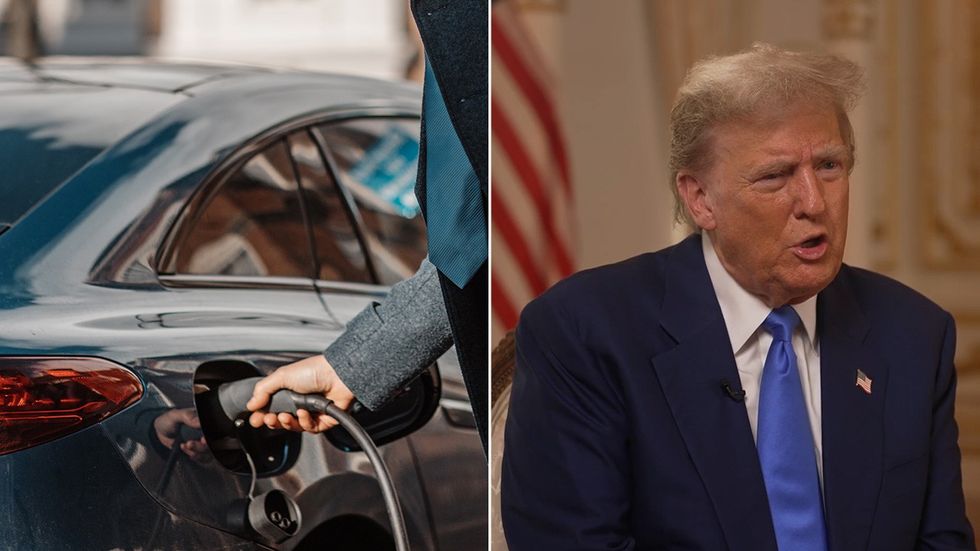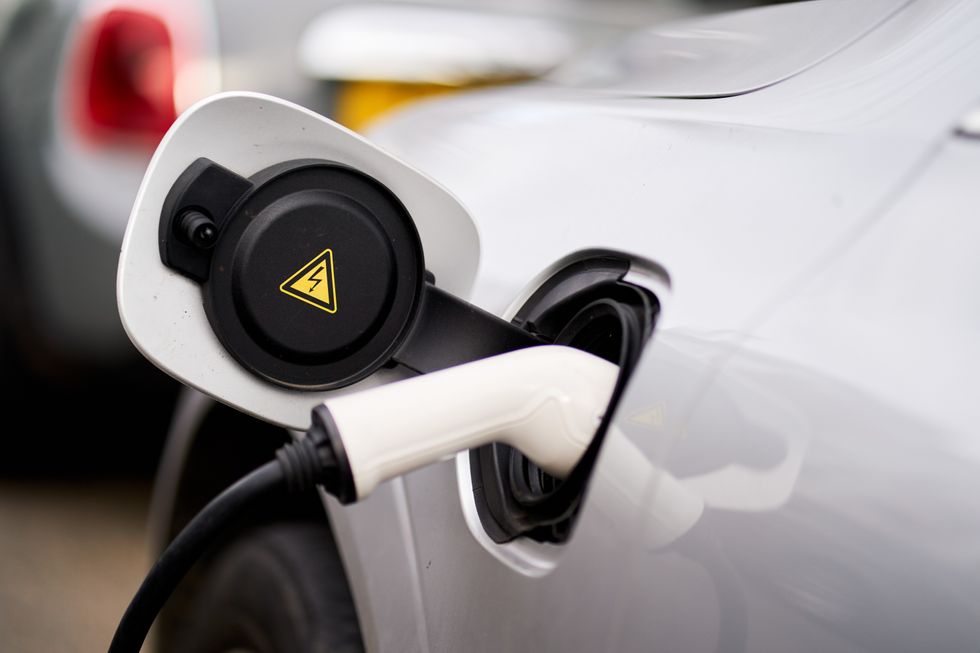Hemma Visavadia
Guest Reporter
Donald Trump’s administration is set to make sweeping changes to US electric vehicle policies, with plans to dismantle key elements of President Joe Biden's emission reduction strategy.
The proposals, revealed in documents seen by Reuters, would cut off support for electric vehicles and charging stations while strengthening measures to block Chinese cars, components and battery materials.
The dramatic shift in policy comes as America's electric vehicle transition faces headwinds and China's heavily subsidised EV industry continues to grow.
Trump had previously vowed on the campaign trail to ease regulations on fossil-fuel cars and roll back what he termed Biden's "EV mandate".
Do you have a story you'd like to share? Get in touch by emailing [email protected]

Under the proposals, the Trump team plans to eliminate Biden's $7,500 (£5,500) tax credit for consumer EV purchases. The transition team also aims to claw back remaining funds from Biden's $7.5billion (£5.9billion) charging station initiative.
This money would instead be redirected towards battery-minerals processing and what the document describes as the "national defense supply chain and critical infrastructure".
The changes could significantly impact US EV sales and production, affecting major manufacturers like General Motors and Hyundai who have recently expanded their electric vehicle offerings.
Tesla, currently the dominant US EV seller, could also face challenges, though its CEO Elon Musk has suggested competitors would be hurt more by losing subsidies.
The transition team recommends imposing global tariffs on battery materials to boost domestic US production. The plan suggests negotiating individual exemptions with allied nations after implementing these broad tariffs.
The proposals mark a stark departure from Biden's approach, which attempted to balance encouraging domestic battery supply chains with rapid EV adoption.
The Defense Department has previously highlighted strategic vulnerabilities due to China's dominance in mining and refining critical minerals, including graphite and lithium needed for batteries.
A 2021 Government report emphasised that "assured sources of critical minerals and materials" are "critical to US national security".
The transition team proposed rolling back emissions and fuel-economy standards to 2019 levels, allowing vehicles to produce approximately 25 per cent more emissions per mile than current 2025 limits.
The changes would also permit the average fuel economy to be about 15 per cent lower than present requirements.
The plan also seeks to block California from implementing its own stricter vehicle-emissions standards, which more than a dozen other states have adopted.
California has requested permission from the US Environmental Protection Agency to require all vehicles to be electric, plug-in hybrid or hydrogen-powered by 2035. But the Biden administration has not yet approved the request.
LATEST DEVELOPMENTS:

Trump's transition team spokeswoman Karoline Leavitt defended the proposals, stating that voters had given Trump a mandate to deliver on campaign promises.
"When he takes office, President Trump will support the auto industry, allowing space for both gas-powered cars and electric vehicles," Leavitt said in a statement.
Find Out More...
The proposals, revealed in documents seen by Reuters, would cut off support for electric vehicles and charging stations while strengthening measures to block Chinese cars, components and battery materials.
The dramatic shift in policy comes as America's electric vehicle transition faces headwinds and China's heavily subsidised EV industry continues to grow.
Trump had previously vowed on the campaign trail to ease regulations on fossil-fuel cars and roll back what he termed Biden's "EV mandate".
Do you have a story you'd like to share? Get in touch by emailing [email protected]

Under the proposals, the Trump team plans to eliminate Biden's $7,500 (£5,500) tax credit for consumer EV purchases. The transition team also aims to claw back remaining funds from Biden's $7.5billion (£5.9billion) charging station initiative.
This money would instead be redirected towards battery-minerals processing and what the document describes as the "national defense supply chain and critical infrastructure".
The changes could significantly impact US EV sales and production, affecting major manufacturers like General Motors and Hyundai who have recently expanded their electric vehicle offerings.
Tesla, currently the dominant US EV seller, could also face challenges, though its CEO Elon Musk has suggested competitors would be hurt more by losing subsidies.
The transition team recommends imposing global tariffs on battery materials to boost domestic US production. The plan suggests negotiating individual exemptions with allied nations after implementing these broad tariffs.
The proposals mark a stark departure from Biden's approach, which attempted to balance encouraging domestic battery supply chains with rapid EV adoption.
The Defense Department has previously highlighted strategic vulnerabilities due to China's dominance in mining and refining critical minerals, including graphite and lithium needed for batteries.
A 2021 Government report emphasised that "assured sources of critical minerals and materials" are "critical to US national security".
The transition team proposed rolling back emissions and fuel-economy standards to 2019 levels, allowing vehicles to produce approximately 25 per cent more emissions per mile than current 2025 limits.
The changes would also permit the average fuel economy to be about 15 per cent lower than present requirements.
The plan also seeks to block California from implementing its own stricter vehicle-emissions standards, which more than a dozen other states have adopted.
California has requested permission from the US Environmental Protection Agency to require all vehicles to be electric, plug-in hybrid or hydrogen-powered by 2035. But the Biden administration has not yet approved the request.
LATEST DEVELOPMENTS:
- Iconic UK bar forced to close amid ‘utterly ridiculous’ Low Emission Zone making the city a ‘no-go’ area
- Drivers at severe risk of being left stranded on UK roads amid lack of charging infrastructure
- Local areas given more powers to introduce 20mph limits on UK roads - ‘Easier and more open’

Trump's transition team spokeswoman Karoline Leavitt defended the proposals, stating that voters had given Trump a mandate to deliver on campaign promises.
"When he takes office, President Trump will support the auto industry, allowing space for both gas-powered cars and electric vehicles," Leavitt said in a statement.
Find Out More...